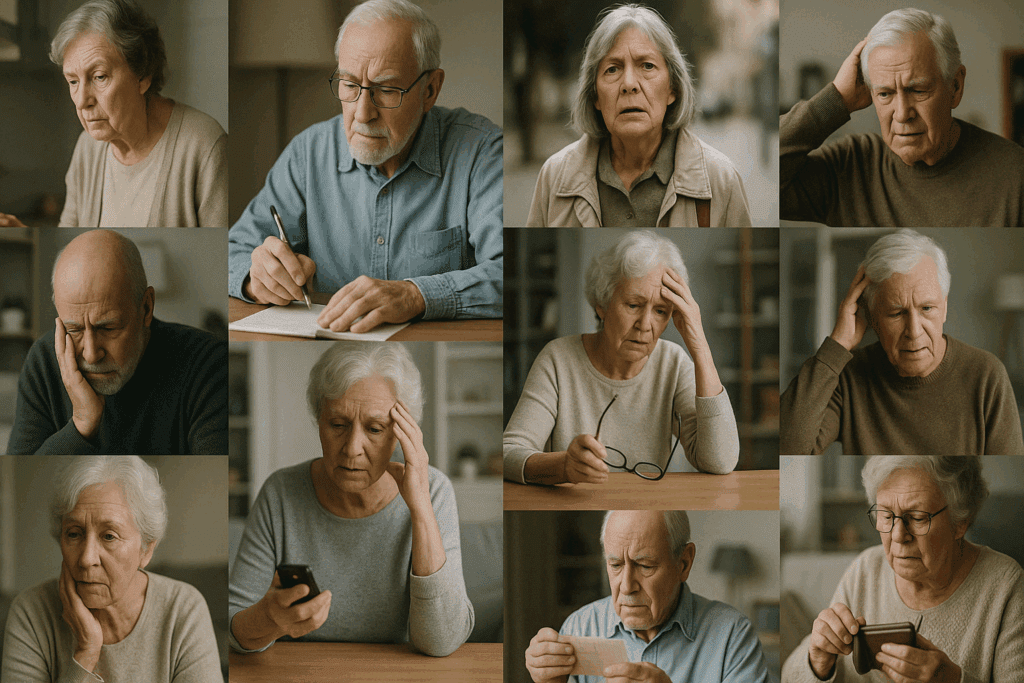In the quiet moments of our daily routines, subtle changes in our loved ones can go unnoticed. A missed appointment, a forgotten name, or a repeated question might seem inconsequential. Yet these signs may hint at a deeper, underlying issue: the early signs of dementia. As life expectancy continues to increase, understanding what causes memory loss and forgetfulness in seniors has never been more important. This article explores not only the symptoms that may appear early on but also the science behind them, offering readers practical insight and medically grounded knowledge that respects both the complexity of the human brain and the unique experiences of aging individuals.
You may also like: How to Preve nt Dementia and Alzheimer’s Disease Naturally: Expert-Backed Strategies to Reduce Your Risk Through Lifestyle and Diet

Recognizing the Earliest Indicators of Cognitive Decline
Dementia is not a single disease but a collective term for conditions characterized by the progressive decline of cognitive functions such as memory, reasoning, language, and problem-solving. One of the earliest signs of dementia is short term memory loss, which may be dismissed as a natural part of aging. However, when forgetfulness interferes with everyday life, it warrants further investigation. People often ask, “Why is my memory so bad all of a sudden?” or “Why am I forgetting things I just did?” While momentary lapses are common, consistent patterns of forgetfulness may be early signs of dementia that you never ignore.
For example, a grandparent who frequently forgets where they placed items or repeatedly asks the same questions may exhibit the signs that your grandpa has dementia. These are not simply quirks of aging but warning signals of potential neurodegenerative changes. It is crucial to differentiate between what is considered normal age-related forgetfulness and what may signal the beginning of cognitive impairment. Experts emphasize that while minor memory lapses happen to everyone, difficulty retaining new information, challenges in performing familiar tasks, or sudden confusion in familiar environments are among the earliest dementia symptoms.

The Gender-Specific Nuances: Early Signs of Dementia in Women
While dementia affects both men and women, research suggests there are unique challenges in identifying the early signs of dementia in women. Hormonal changes during menopause, for instance, can contribute to short memory loss and brain fog, making it more difficult to recognize early signs of dementia in women. Additionally, women often shoulder caregiving responsibilities and may downplay their own cognitive symptoms, attributing them to stress or fatigue.
Understanding the signs of dementia in women requires a more nuanced approach. Studies indicate that women with Alzheimer’s disease tend to experience more rapid memory decline than men in the early stages. This gender disparity may lead to underdiagnosis or delayed intervention. For women, early signs can include misplacing items, withdrawing from social interactions, or struggling to maintain daily routines. These symptoms may be subtle but significant, especially when they interfere with occupational or familial responsibilities.
One of the challenges faced by clinicians is discerning whether reported symptoms are due to hormonal changes, psychological stress, or early neurodegeneration. Hence, a comprehensive assessment is necessary, taking into account personal history, lifestyle factors, and standardized cognitive screening tools. Early detection not only improves quality of life but also allows for proactive planning and potential participation in clinical trials.
Why Am I Forgetting Things? Differentiating Between Normal Aging and Dementia
One of the most common questions people ask as they age is, “Why am I forgetting things more often?” It is important to recognize that memory changes can be a normal part of aging. However, when memory lapses begin to interfere with daily life, they could reflect deeper cognitive issues. Understanding the difference between forgetfulness vs dementia is critical for timely intervention and peace of mind.
Normal age-related memory decline may involve temporarily forgetting names or appointments but remembering them later. In contrast, dementia-related memory loss is more persistent and progressive. Individuals may forget recent events entirely, struggle to follow conversations, or lose track of time and place. This distinction is not always obvious to family members, who may dismiss early red flags as typical aging behaviors.
Memory loss is not the only symptom of dementia, but it is often the most noticeable. Other signs of dementia include language difficulties, impaired judgment, mood changes, and disorientation. Understanding what causes memory loss and forgetfulness can empower individuals to seek appropriate medical advice. Conditions such as vitamin deficiencies, thyroid imbalances, or medication side effects may mimic dementia symptoms and are reversible. Therefore, an accurate diagnosis is essential.

Short Term Memory Loss in Seniors: When to Be Concerned
Short term memory loss in seniors is one of the hallmark indicators of cognitive impairment. It often manifests as the inability to retain recently learned information. A senior might forget what they had for breakfast or repeat the same story multiple times in a single conversation. While such behaviors may appear benign, they can be early signs of dementia that you never ignore.
Short term memory loss old age patterns typically become more pronounced over time, raising the question, “Why is my short term memory so bad?” There are several potential explanations, ranging from natural brain aging to more serious conditions such as Alzheimer’s disease. The hippocampus, a region of the brain critical for forming new memories, is particularly vulnerable to aging and dementia-related damage.
When evaluating short term memory loss, it is important to consider the broader context. Are there accompanying changes in behavior, personality, or functional abilities? Do these lapses create safety concerns, such as forgetting to turn off the stove or getting lost in familiar neighborhoods? These factors distinguish normal forgetfulness from pathological cognitive decline. Understanding what causes short term memory loss allows for more effective interventions and supports.

What Are the 10 Warning Signs of Dementia?
Clinicians and researchers have identified several early indicators that may point to dementia. Among these, the 10 warning signs of dementia serve as a helpful guide for families and caregivers. These include memory loss that disrupts daily life, challenges in planning or solving problems, difficulty completing familiar tasks, confusion with time or place, trouble understanding visual images, problems with words in speaking or writing, misplacing items, poor judgment, withdrawal from work or social activities, and changes in mood or personality.
Each of these warning signs has its nuances. For example, while everyone may occasionally misplace keys, a person with dementia might forget the purpose of the keys or how to use them. Similarly, forgetting names is common, but consistently forgetting familiar faces or relationships can be more concerning. Recognizing these signs is especially vital for individuals who ask, “Does my mom have dementia?” or “Is forgetting names a sign of dementia?”
Being familiar with the 10 warning signs of dementia equips families with the knowledge to seek help early. Early diagnosis opens the door to supportive care, memory interventions, and medications that may slow progression. Furthermore, it provides an opportunity for individuals to participate in legal, financial, and personal planning while they still have decision-making capacity.

Understanding the Difference Between Dementia and Amnesia
Confusion between dementia and amnesia is common, especially since both involve memory loss. However, the difference between dementia and amnesia lies in the scope and progression of symptoms. Amnesia typically refers to a sudden loss of memory resulting from injury, trauma, or neurological disruption. It may affect specific types of memory but does not usually impair other cognitive functions.
Dementia, on the other hand, involves a broader and more gradual decline in cognitive abilities. In addition to memory, it impacts language, executive function, and behavior. Dementia symptoms worsen over time, whereas amnesia may improve, stabilize, or remain limited to specific memories. Understanding these differences is critical for accurate diagnosis and treatment planning.
Families who notice that a loved one is becoming more forgetful may wonder, “What disease causes memory loss?” While dementia is a common cause, other conditions such as brain injuries, infections, and psychological disorders can also contribute. This reinforces the importance of a thorough medical evaluation when memory problems arise.
What Causes Memory Issues in Aging Adults?
Memory issues in aging adults can be multifactorial. While dementia is a significant concern, it is not the only cause of forgetfulness. So, what causes memory issues in older adults aside from dementia? Sleep disorders, depression, chronic stress, and medication side effects are just a few potential contributors.
Moreover, social isolation and reduced cognitive stimulation can exacerbate memory problems. Questions like “Does not talking lead to memory loss?” are more relevant than one might think. Research indicates that regular social interaction is protective against cognitive decline. Conversations stimulate multiple brain regions and reinforce memory circuits. Thus, seniors who are less socially engaged may experience faster deterioration in memory.
Another factor to consider is the impact of metabolic and cardiovascular health. Poor circulation, high blood pressure, and diabetes can impair brain function and increase dementia risk. Understanding what causes lack of memory requires a comprehensive approach that looks at both biological and environmental influences.
Why Am I Forgetting Things All of a Sudden?
When memory loss appears abruptly, it can be particularly alarming. Many individuals in midlife or older adulthood find themselves wondering, “Why am I forgetting things all of a sudden?” Sudden memory lapses may be due to acute stress, sleep deprivation, nutritional deficiencies, or side effects from new medications.
In some cases, these episodes may be transient and reversible. However, when sudden forgetfulness is accompanied by other symptoms such as confusion, language problems, or personality changes, it may suggest an evolving neurocognitive disorder. Early signs of dementia test protocols often include memory recall assessments, attention tests, and language evaluations. These tools help differentiate temporary forgetfulness from signs of progressive disease.
It is important to seek medical attention when memory issues interfere with daily functioning or worsen over time. Identifying reversible causes can lead to effective treatment, while diagnosing dementia early allows for more effective care planning and support.

Things That Cause Forgetfulness in Old People
As people age, many wonder what causes memory loss and forgetfulness. Several factors beyond dementia contribute to cognitive lapses in older adults. Among the most common things that cause forgetfulness in old people are stress, fatigue, poor nutrition, dehydration, and certain chronic illnesses.
Chronic stress, in particular, can flood the brain with cortisol, a hormone that interferes with memory formation. Meanwhile, dehydration can lead to confusion and mental fog, especially in seniors who may have diminished thirst perception. Medications used to manage chronic diseases can also have cognitive side effects, especially those with anticholinergic properties.
Even sensory impairments, such as hearing or vision loss, can contribute to apparent memory problems. When information is not received clearly, it is harder for the brain to encode it for storage. Recognizing what causes memory loss and forgetfulness in older adults requires a holistic view of their physical and mental health status.

When to Seek Help: Navigating Early Signs with Compassion and Clarity
Whether you’re noticing signs that your grandpa has dementia, wondering why your short term memory is so bad, or asking, “Does my mom have dementia?” the most important step is seeking medical evaluation. Timely intervention can improve outcomes, both by identifying treatable causes and enabling early dementia therapies. There is no single test for dementia, but a combination of cognitive assessments, medical imaging, and lab work can provide clarity.
Healthcare providers often recommend that anyone exhibiting early signs of dementia, especially persistent short memory loss or changes in behavior, undergo evaluation. When in doubt, it is better to investigate rather than dismiss potential symptoms. Families should keep notes on observed changes, track patterns, and be proactive in raising concerns with primary care providers.
Ultimately, understanding what causes short term memory and the difference between dementia and amnesia helps dispel myths and reduce stigma. Memory loss is not always inevitable, and in many cases, it can be managed or mitigated with the right support.
Frequently Asked Questions: Early Signs of Dementia and Memory Loss in Seniors
1. What subtle signs might suggest my grandpa is developing dementia, even before memory loss becomes obvious?
Some of the earliest signs that your grandpa has dementia may manifest not as forgetfulness, but as subtle shifts in behavior or mood. For example, he might become unusually withdrawn, irritable, or even apathetic toward hobbies he once loved. These emotional or social changes often precede more recognized dementia symptoms like short term memory loss. Family members sometimes overlook these early indicators, especially when they assume changes are simply due to aging. However, noticing that a loved one is less engaged or begins to display uncharacteristic behaviors may be just as important as tracking memory lapses when evaluating early signs of dementia.
2. Are there early dementia symptoms that specifically affect women differently than men?
Yes, the early signs of dementia in women can present differently than in men due to both biological and social factors. Hormonal changes during menopause may intensify cognitive fluctuations, making it harder to separate normal midlife memory issues from the signs of dementia in women. Additionally, women often internalize stress differently, which may result in symptoms like emotional blunting or overwhelm that aren’t immediately identified as cognitive decline. Because women also frequently serve as caregivers, their symptoms may be underreported or dismissed. It’s vital to evaluate memory loss and behavioral shifts through a gender-sensitive lens, especially when seeking an early signs of dementia test.
3. Can lack of regular conversation and social interaction really contribute to memory decline?
The question “Does not talking lead to memory loss?” is gaining more attention in research, and the answer is increasingly yes. Isolation reduces cognitive stimulation, and language use itself helps strengthen memory networks in the brain. When individuals, especially seniors, experience prolonged silence or lack of meaningful conversation, they may show signs of dementia earlier due to underused neural circuits. Social interaction serves as both preventive care and a diagnostic tool: noticing who struggles to follow conversations or loses the thread of discussion can highlight early dementia symptoms. Reintroducing daily dialogues and social engagement can be one of the simplest and most overlooked interventions for memory support.
4. What distinguishes normal forgetfulness from serious cognitive decline in seniors?
Understanding the difference between forgetfulness vs dementia hinges on recognizing patterns and progression. For example, forgetting where you placed your glasses occasionally is common; forgetting what the glasses are for is not. Short term memory loss in seniors due to dementia is usually accompanied by challenges in problem-solving, spatial awareness, or changes in communication. Moreover, what causes short term memory loss often differs from what causes lack of memory altogether—the former may stem from sleep or stress, while the latter may indicate underlying neurodegeneration. Ultimately, the consistency and impact of the forgetfulness on daily functioning are what set dementia apart from aging-related memory slips.
5. What role does stress play in sudden memory problems, and how can you tell if it’s dementia?
When someone asks, “Why am I forgetting things all of a sudden?”, stress is a plausible explanation—but it’s not always the full story. Chronic stress triggers a hormonal cascade that impairs the hippocampus, the brain’s memory center. This can lead to symptoms mimicking dementia, such as short memory loss or confusion. However, stress-related forgetfulness tends to fluctuate and improve with rest or relaxation, whereas early signs of dementia do not reverse spontaneously. An early signs of dementia test can help distinguish between psychological and neurodegenerative origins of memory issues, especially when sudden forgetfulness becomes consistent and disruptive.
6. How can caregivers support someone who shows early signs of dementia without causing distress?
Acknowledging the early signs of dementia that you never ignore requires both vigilance and sensitivity. Caregivers should observe patterns over time rather than react to isolated events, focusing on compassionate communication and reassurance. Creating a structured, predictable environment can reduce anxiety and support memory, especially when short term memory loss old age patterns begin to emerge. It’s also helpful to keep records of behavior changes for medical consultations. By understanding what causes memory loss and forgetfulness—from sensory decline to medication side effects—caregivers can become advocates for proactive healthcare rather than alarmists.
7. What are some overlooked things that cause forgetfulness in old people that aren’t always dementia?
While dementia is a common concern, many things that cause forgetfulness in old people are reversible and benign. Dehydration, for instance, can mimic signs of dementia by inducing confusion and attention deficits. Low vitamin B12 levels can lead to what causes memory issues that feel eerily similar to neurodegenerative conditions. Sensory impairments like undiagnosed hearing loss can cause people to miss verbal cues, leading them to believe they’ve forgotten information they never actually processed. Furthermore, certain medications can produce cognitive side effects resembling early signs of dementia. Therefore, a comprehensive medical review is essential when cognitive changes arise.
8. Is it true that forgetting names could indicate more serious issues like dementia?
Forgetting names occasionally is common, but when it becomes a consistent problem, it can be more concerning. The question “Is forgetting names a sign of dementia?” depends on frequency and context. In dementia, the issue often isn’t just forgetting a name, but also struggling to recall relationships or recognizing familiar faces. These deeper recognition failures often point to what disease causes memory loss beyond benign forgetfulness. When paired with other cognitive disruptions like poor judgment or confusion, persistent name forgetfulness should be evaluated as part of early signs of dementia.
9. What should you do if you’re concerned about a loved one showing memory decline?
If you’re noticing the signs that your grandpa has dementia or asking yourself, “Does my mom have dementia?”, the first step is gentle observation. Avoid confrontation or accusations; instead, document behavioral patterns that might align with the 10 warning signs of dementia. Encourage a routine health check-up and share your observations with their physician. There are early signs of dementia test protocols that can be conducted in primary care settings to assess whether further neuropsychological evaluation is needed. Acting early, even on subtle symptoms, provides the best chance for planning, treatment, and preserving quality of life.
10. Is memory loss just a normal part of aging, or should it always raise concern?
People often wonder, “Is memory loss a normal part of aging?” and the answer is nuanced. Some cognitive slowing is expected with age—like taking longer to recall a word—but this doesn’t usually interfere with daily functioning. In contrast, dementia symptoms include impairments that disrupt life, such as getting lost in familiar areas or forgetting to eat. Short term memory loss in seniors, especially when escalating, warrants attention. Understanding what causes memory loss and forgetfulness through medical evaluation ensures that reversible causes aren’t overlooked and that signs of dementia are addressed as early as possible.
Conclusion: Understanding the Early Signs of Dementia in Seniors and Taking Informed Action
The journey through aging often brings with it reflections on time, memory, and legacy. For many, the emergence of forgetfulness raises fears about what may lie ahead. Yet knowledge is power, and understanding the early signs of dementia is a crucial first step toward compassionate and informed care. From recognizing what disease causes memory loss to distinguishing between forgetfulness vs dementia, every insight contributes to a more proactive, dignified approach to aging.
Seniors may experience short term memory loss for a variety of reasons, but when that forgetfulness disrupts everyday life, it should never be ignored. Whether you’re asking “Why is my memory so bad?” or noticing the signs of dementia in women close to you, early awareness enables early action. There are real, identifiable patterns in dementia symptoms—and many of them, such as what causes memory issues or why a person becomes more forgetful, can be evaluated through medical and cognitive assessments.
By honoring the lived experiences of aging individuals and applying scientific understanding to their symptoms, we open the door to better care, better outcomes, and better conversations. Remember: the early signs of dementia that you never ignore are not just clinical markers; they are opportunities to show love, offer support, and create a future that respects both autonomy and well-being. If you’re wondering, “Is memory loss a normal part of aging?” the answer is that while some decline is natural, persistent or severe forgetfulness deserves compassionate attention. Because when it comes to cognitive health, every moment—and every memory—matters.
Was this article helpful? Don’t let it stop with you. Share it right now with someone who needs to see it—whether it’s a friend, a colleague, or your whole network. And if staying ahead on this topic matters to you, subscribe to this publication for the most up-to-date information. You’ll get the latest insights delivered straight to you—no searching, no missing out.
Further Reading:
10 Early Signs and Symptoms of Alzheimer’s and Dementia
Memory Problems, Forgetfulness, and Aging
15 Warning Signs of Dementia You Shouldn’t Ignore
Disclaimer
The information contained in this article is provided for general informational purposes only and is not intended to serve as medical, legal, or professional advice. While Health11News strives to present accurate, up-to-date, and reliable content, no warranty or guarantee, expressed or implied, is made regarding the completeness, accuracy, or adequacy of the information provided. Readers are strongly advised to seek the guidance of a qualified healthcare provider or other relevant professionals before acting on any information contained in this article. Health11News, its authors, editors, and contributors expressly disclaim any liability for any damages, losses, or consequences arising directly or indirectly from the use, interpretation, or reliance on any information presented herein. The views and opinions expressed in this article are those of the author(s) and do not necessarily reflect the official policies or positions of Health11News.


